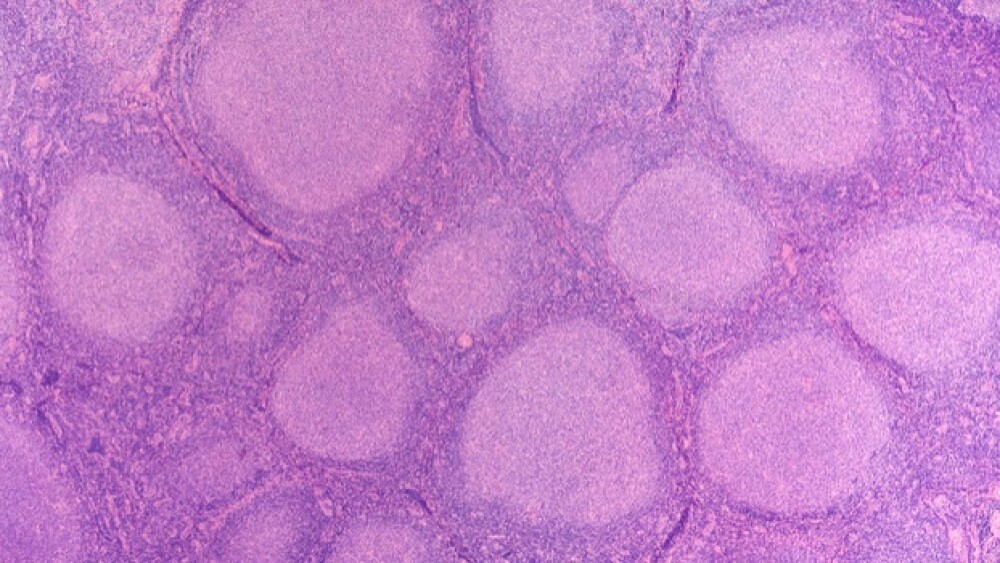Despite some of the troubles Epizyme has seen with its lead drug candidate tazemetostat, including a partial clinical hold placed by the U.S. Food and Drug Administration, the company is pushing forward with positive interim data presented at the 23rd Congress of the European Hematology Association.
Despite some of the troubles Epizyme has seen with its lead drug candidate tazemetostat, including a partial clinical hold placed by the U.S. Food and Drug Administration (FDA), the company is pushing forward with positive interim data presented at the 23rd Congress of the European Hematology Association.
Epizyme presented data from its ongoing Phase II study in patients with relapsed or refractory follicular lymphoma (FL). Data shows that tazemetostat, a first-in-class, oral EZH2 inhibitor, demonstrated meaningful clinical activity and was generally well tolerated in these “heavily pre-treated patients.”
The interim data presented included 82 evaluable patients across two cohorts who were prospectively assigned by EZH2 status. In the EZH2 activating mutation cohort, an objective response rate (ORR) of 71 percent was observed; 11 percent of patients achieved a complete response (CR), and 61 percent achieved a partial response (PR), the company said. Additionally, Epizyme said 29 percent of patients achieved stable disease (SD) as best response. Of those patients, 21 percent are still on the study with the potential to respond, the company said.
In its presentation data, Epizyme said all patients in that cohort experienced a reduction in tumor burden, None of the patients experienced progressive disease (PD) as best response. At the time of the analysis, Epizyme said the median progression-free survival (PFS) was 49 weeks and the median duration of response (DOR) was 32 weeks. Both endpoints continue to mature, the company added.
In the fully-enrolled cohort of follicular lymphoma patients with wild-type (WT) EZH2, the ORR was 33 percent. Only 6 percent achieved a complete response and 28 percent achieved a partial response, the company said. An additional 31 percent of patients achieved stable disease as best response, including one patient who is still receiving treatment. At the time of this analysis, the median PFS was 30 weeks and median DOR was 76 weeks. The median DOR figure continues to mature, with more than half of the responders still on therapy, Epizyme said.
Follicular Lymphoma, an indolent form of non-Hodgkin lymphoma (NHL), is considered to be incurable. Approximately 25,000 patients in the U.S. and major European countries are diagnosed with FL every year, of which an estimated 15 to 20 percent have an EZH2 mutation. There are no approved treatments indicated for patients with FL with an EZH2 mutation. In April 2017 tazemetostat received Fast Track Designation for the treatment of patients with relapsed or refractory follicular lymphoma, either wild type EZH2 or with EZH2 activating mutations.
Robert Bazemore, Epizyme’s president and chief executive officer, said the data underscores the company’s belief that tazemetostat could be an important treatment in relapsed or refractory follicular lymphoma. Furthermore, Bazemore said tazemetostat may play a key role in the treatment landscape, regardless of mutational status.
Gilles Salles, president of the Lymphoma Study Association, said he was impressed by the “sustained clinical activity and the good tolerability of tazemetostat in this heavily pre-treated patient population.” He called for additional study of tazemetostat as single agent or in combination with other agents.
Additional study may have to wait a bit due to the hold placed on tazemetostat by the FDA. In April the FDA placed a temporary hold on Epizyme’s tazemetostat programs due to safety concerns. The hold was placed following the report of a pediatric patient who developed a secondary lymphoma. The hold affects new enrollment of patients with genetically defined solid tumors and hematologic malignancies. Epizyme is working to address the concerns and move forward with its studies.





